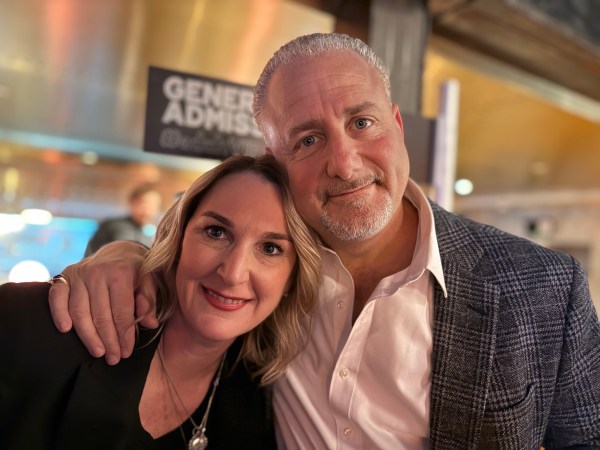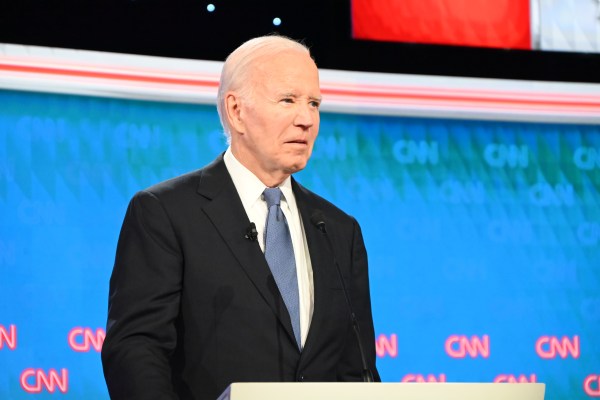Happy Sunday. For once, I get to blame you instead of myself for the length of one of my pieces: Readers left no less than 199 comments in my mailbag thread, and I felt obliged to reward the enthusiastic response with thorough replies.
Also, what did y’all think “pleonastic” meant? Vibes? Papers? Essays?
I suppose it does mean “essays,” actually. Long ones.

JohnM: Why can’t we see what you look like?
There’s no need. I can paint you a picture in three words that’s as vivid as any photo: “Hotter Danny DeVito.”
I don’t show my face for two reasons. One is that it’s the last vestige of mystery remaining from my “Allahpundit” days, now that I’ve let my arm be twisted into doing voice promos for Dispatch podcasts. I like that readers can imagine the narrator in my newsletter to be whoever they like.
The other is that bald men should be heard and not seen, generally speaking. It looks great on those who project a sense of extreme physical or intellectual formidability, like Dwayne Johnson or Kevin “The Rock” Williamson; the rest of us are Stephen Millers, schlubs whose vast foreheads function as billboards advertising diminishment with age. To me, it feels roughly as dignified as having to walk around with your fly perpetually open. Imagine being photographed in such a condition.
If you’re really curious, though, the celebrity to whom I was compared most often as a younger man was Jeremy Piven. Picture Pivs—minus the hair transplant and sallow from decades slouched in front of a computer—and you’re in the ballpark.
BigDonMcK: How many hours a day, on average, do you spend on a column? How much of that is research and how much is writing?
The workday lasts 10 hours, give or take. The first three are spent sifting through news on Twitter and RSS, waiting for inspiration to strike. At some point around 10 a.m. ET, I’ll check in with our editors to spitball a topic. I like to be writing by 10:30 and aim to finish by 4:30, less because I’ve run out of things to say—I could babble on and on, as this column will demonstrate—and more to spare the editors waiting on my copy from having to work deep into the evening. (And subscribers from having to read deep into the evening.) Edits usually take 60-90 minutes, and then the piece is published.
My secret weapons are the “Collections” feature in Microsoft Edge and a program called Diigo. Diigo lets you highlight text on a webpage and remembers those highlights when you reload the page later. “Collections” makes it easy to create folders for bookmarks and to organize them by topic. Whenever I’m reading a news story that feels like it might be future column material, I highlight the key parts and file the link away in the appropriate “Collections” folder. Then, when I’m writing on a topic later, it’s a simple matter of reopening the pages in the relevant folder and skimming all of the highlighted parts.
If you’ve ever wondered how a column written in six hours can contain 30 links, that’s how.
JMcGuirk: I wonder if you’d describe yourself as more liberal today than you were in 2001, and whether you’d attribute that shift to Trump?
That’s hard to answer because it’s not clear anymore what “liberal” is. I think the government should enforce the southern border far more strictly than Joe Biden did. I also think it shouldn’t deport immigrant gang members to Central American gulags, certainly not without first making sure that they really are immigrants and gang members. Am I “liberal”?
My shift has less to do with policies than with intentions. Before Trump, I took it for granted that Republicans meant well and Democrats did not, and it was through that lens that I understood their agendas. That was foolish. The modern activist right is so far past caring about virtue, public or otherwise, that it’s allowed its fetish for ruthlessness to hatch a bona fide anti-Christian rival morality. It’s a movement of, by, and for demagogues. If finding that, and them, beneath contempt makes one a “liberal” then, sure, I’ll wear that.
Liberals have various dumb ideas and a few pernicious ones, but there’s been only one near-autogolpe in American history, and they weren’t the ones behind it. That’s the one-sentence explanation of how I approach politics now.
AMI: Have you put all your articles and musings and stories into a database where you can use algorithms to search what you have already written?
The archives are searchable, but they’re already so vast that combing through them to see if I’ve said anything before about a particular subject is too much of a time-suck. Sometimes a friend will ask me what I wrote about over the past week and I can’t tell him because I honestly don’t remember. It’s all a blur. (Although “five columns about Trump” is usually a safe bet.)
It can present challenges, too. I woke up one day not long ago thinking I’d write about an alternate history in which Trump wins the 2020 election, only to have our executive editor inform me that I’d written that column already. He had to remind me of my work product.
I don’t consider myself truly done with a topic until I’ve written the same newsletter about it three times.
H.W.: Given the impressive quantity and quality of writing you put out, do you even have time to relax with some garbage TV? I’m curious, what is your brain candy?
I do have time. Writing a long piece every weekday for The Dispatch actually involves considerably less work than my old gig blogging at Hot Air did. That was 12 hours a day (more in the early years) and required research and writing on six or seven topics instead of one. I’ll bet I reliably wrote 5,000 words daily, twice as much as here.
By the time I closed the laptop at night my head was swimming, which is how I became addicted to garbage TV. I couldn’t muster the mental energy for anything intellectually demanding, even when vegetating in front of a television. I needed an escape. My gateway drug was ghost nonsense on the Travel Channel; I later started mainlining true-crime porn on Investigation Discovery. Eventually, I hit rock bottom with TLC freak shows. Occasionally, I’d go on benders, spending hours watching bake-offs on the various food networks. The less plot there was, the fewer IQ points needed to keep up, the better. “Give me something I can follow if I’m catatonic” was my motto, since that’s essentially what happens to you after 12 to 14 hours of blogging.
My tastes have improved since coming to The Dispatch, as I no longer end each day feeling like an overheated CPU, but the lure of garbage remains. I’m not proud to say that there’s almost nothing related to 90 Day Fiancé that I won’t watch, and really no show so stupid that I won’t give it a chance. You’re reading the words of a man who’s endured multiple seasons of The Bachelor, if you can believe it. But I do admit to having bailed on The Curse of Oak Island: I’ll watch a treasure hunt, but an endless hunt for treasure that obviously doesn’t exist is beneath even a junkie’s dignity.
As with Oscar the Grouch, so too with me—for reasons we may never understand, grumpy curmudgeons gravitate towards trash.
Peter T: When did you have the “aha, turn away from the cliff” moment with Trump?
When I was 12 years old.
My family was working-class. Not once during my childhood did my father bring home the New York Times, the newspaper of the upper class. He bought the tabloids, the New York Post and the New York Daily News, and my first encounter with Donald Trump was in their gossip columns. I have a dim memory of reading the famous “BEST SEX I’VE EVER HAD” story in the Post the day it was published, which was, of course, orchestrated by Trump himself. That much was obvious even to my teenage self.
He was a Page Six freak show, tackiness personified, which is not to say that I disliked him. On the contrary, there was a sense in the local coverage of Trump that New Yorkers were expected to like him—or at least to appreciate his louche charm as something distinctive to their city’s character. Like his pal Rudy Giuliani, he was one of those audacious, larger-than-life sociopaths who, in the press’ eyes, gave NYC its “color.” But unlike Rudy, no one took him seriously. He was a playboy and a media whore and you could enjoy him in those roles, comic relief in the daily life of New York, but you would never trust him with authority. Or with anything, really.
It hit me like a truck in 2015 when I realized that most of the country lacked that frame of reference. They thought he was a business genius because he played one on television. I knew that he was actually Cindy Adams’ dancing monkey. A decade later, the shock still hasn’t worn off. I cannot believe that the “BEST SEX I’VE EVER HAD” clown is not only the president, he’s the head of a fascist cult that wants to depose the Constitution and make him king. It’s as if Hugh Hefner had become the leader of al-Qaeda.
It’s the strongest evidence I know of that we’re living in a simulation, and whoever’s running it is deliberately messing with us.
Coolidge’s Burner: Will you ever appear on the Dispatch Live podcast or at a live event?
Probably not a live event, but I’m keeping my powder dry for an appearance someday on The Dispatch Podcast. I want it to be a special occasion, like the next time Trump pulls something on the order of January 6. (And he will.) It would be fun to talk to Sarah, Jonah, and Steve before we’re all loaded on the plane to El Salvador.
My main hang-up (besides being shy) is that I’d want to be my authentic self, and that would be tricky on a podcast that doesn’t allow profanity. I’m a half-Italian guy who was raised in Queens; I tend to sound like a Scorsese character in conversation, especially when I’m worked up. If we can’t capture the magic of that on the DisPod, then why bother?
JakeTheGreat1536: If you have any free time (you know, when you’re not busy writing the next day’s newsletter), do you enjoy reading books? And if so, which ones?
This is my darkest secret, the true bombshell in this Dispatch version of a Reddit AMA: I’ve read maybe 10 books total in the many years since I graduated from college.
The last one, SPQR: A History of Ancient Rome by Mary Beard, was in 2022, as I recall.
It’s so shameful. My defense is that I spend hours each day reading news stories and political commentary, which makes the prospect of even longer reading in the evening daunting, but that’s really no defense at all. Most people who do what I do for a living face the same challenge and manage just fine. Having to write alongside Jonah Goldberg and Kevin Williamson feels like a cosmic joke, in fact, in that their columns routinely reference political and economic literature. Meanwhile, I’m on my couch thinking, “Is tonight the night to start Oakeshott? No, Murder in the Heartland is on.”
Murder in the Heartland is how I stay in touch with flyover country, though. I consider it political research.
LiberalCynic: What’s it like being a failed lawyer at a publication that’s increasingly known for its legal coverage?
Brutal. Just when I’d gotten used to being the worst pundit at a political news and commentary site, I have to adjust to being the worst lawyer at a legal news and commentary site. What’s next, Steve Hayes? A Dispatch book-review vertical?
Maybe someday we’ll buy Variety and launch a section devoted to television’s worst programs. Then it’ll be my time to shine.
Howard of Cocoaland: What do you find most dispiriting: Trump himself? The many individual members of Congress putting their seat and position and fear of being primaried over their civic duty? The MAGA primary core and the GOP voter at large? The Dems’ utter inability to check their worst tendencies to form a sane, more center-friendly counter to MAGA/Trump?
Rationally, I know that the correct answer here is the Republican base. They’re the ones who rejected numerous saner alternatives last year and insisted on renominating Trump. They’re the ones who applied the political pressure that guaranteed his acquittal by the Senate after January 6. They’re the ones who treat norm-busting corruption as some sort of political virtue, which is why a sleazebag like Ken Paxton is almost certainly going to smoke John Cornyn in next year’s Texas Senate primary. And they’re the ones who spent the first half of the last decade demagoging “RINOs” for not caring enough about the Constitution and the second half of it demagoging them for caring too much.
Democracy is a market. Because the Republican consumer has an insatiable demand for sh-t, the market has boosted supply to meet it.
Even so, I find myself hating the supply more than I hate the demand. It feels cringe to say “I expected more from Congress”—imagine being so naive as to have expectations for Congress—but it’s true. American democracy is a market, but not an unregulated market. At some point, the majority’s demand for sh-t will bump into constitutional limitations like minority rights and enumerated powers, at which point elected officials are supposed to cut off the supply.
Congressional Republicans have abdicated that duty as comprehensively as it can realistically be abdicated. I’m convinced that there’s literally no crime Trump could commit now, up to and including treason, that his allies in the House and Senate wouldn’t contrive to excuse him for. I’ve used the word “quislings” in this newsletter to describe them, and I want to make clear here that I’m using it advisedly, not as name-calling. They’re midwifing an American autocracy because they’re amoral cowards who can’t bear to part with the simulacrum of power they wield. With no exaggeration, they’re among the greatest political villains in the history of the country. I detest them.
Jronl2-J: On net, is the writing pace shortening your lifespan, or does not bottling it in improve your health?
It definitely improves it. I’m surely one of the only people in America who gets paid for self-therapy.
When I was hired, I was expected to write two newsletters a week. But that was never going to fly, partly because old habits die hard and partly because of imposter syndrome. After 16 years of writing seven posts per day, one column every three days would have felt like semi-retirement. I would have been nagged forever by the sense that I was goldbricking.
You can take the boy out of the blog, but you can’t take the blog out of the boy.
It also would have haunted me that I was writing no more often than Jonah or Kevin, knowing that they’re going to deliver more intellectual firepower in the average column than I will. How can I pull my weight around here and give readers the same money’s worth as them? Easy: Write more often. Mario Mendoza can and will get the same number of hits as George Brett. He just needs more at-bats.
Many, many more.
HowManyDiscs: Given your moral clarity, do you have a religious affiliation? Were you raised to be devout, whatever your faith? Or is calling out liars something only the non-devout now can do, while others are blinded by partisanship?
I’m a lapsed Catholic turned atheist who retains my affection for Catholic culture. Twelve years of school by Franciscans and Jesuits weren’t enough to make me believe, but they were enough to make me feel kinship with those who do.
Calling out liars certainly isn’t limited to the non-devout. I give you David French or Russell Moore or our own Michael Reneau, to name a few. But I confess that if you showed me two Republicans, one very religious and the other not, and asked me to guess which is more troubled by the Trump corruption du jour in 2025, I know what my guess would be.
The merger of evangelical Christianity with right-wing populist political identity reminds me of the old line about what happens when you mix a pint of ice cream with a pint of dog sh-t. One of the two flavors will dominate, and it won’t be the good one.
PhilBNichols: Referring to your 2,500-word/workday habit, do your writing blocks happen like the [Saturday Night Live] skit about Stephen King where he’s typing furiously while being interviewed, pauses for four seconds, and then continues typing furiously having gotten over his writer’s block?
I can’t recall ever having writer’s block, if by “writer’s block” you mean difficulty starting a column. Daily blogging will breed that out of you. It’s like a college blue-book exam that never ends: The clock starts, you have only so much time, and you must turn something in. The pressure will force you to start writing even if you don’t yet know where you’ll arrive, which is how it goes with easily half of my Dispatch newsletters. I usually land the plane safely, although some landings have been … rough.
There have been a few crashes, however. It doesn’t happen often, but I’ve had days (as recently as the week before last) where I get cracking on a piece and stall out halfway through, with no hope of salvaging something thoughtful before the afternoon deadline. Typically, it happens when I’m trying to be clever by connecting some story that’s in the news with some other not obviously related story and it dawns on me about 1,000 words in that, yeah, they’re really not related. I’m not being clever by linking them, I’m being stupid.
Having to ditch a column in the ocean because I can’t land it on deadline is as close as I get to writer’s block. What an awful feeling. It’s the pundit equivalent of ED.
Austin from Atlanta: Would you be open to more frequently covering topics other than whatever Trump did that week?
I am open to it and am constantly resolving to do so without much success. The preoccupation in my newsletter with all things Trump is the most valid knock on it, I think.
Then again, not since FDR has American politics revolved more tightly around a central figure than it does now. We don’t have a legislature anymore, you may have noticed, and the president regularly does things that have no precedent in their corruption or autocratic aspirations. Trying not to write about Trump in 2025 is like trying not to write about World War II in 1942. You can do it, but why would you want to?
Doctor Dan the Unhelpful: Time for you to weigh in on the Sarah vs. David debate: If someone asks you, “Should I go to law school?” how do you respond?
Do you have an earnest passion for the law, as Sarah does? If yes, can you follow that passion without going deeply into debt? If not, are you willing to endure years of indentured servitude as a corporate drudge, bored to tears and worked nearly to death, to pay off what you owe?
If the answer to any of those questions is yes, then … you probably still shouldn’t go. It takes a special kind to enjoy being a lawyer, I think, and spending three years and tens of thousands of dollars to figure out whether you’re that kind is a very expensive voyage of self-discovery.
In fact, if you have to ask yourself whether you should go to law school, chances are you already know the answer and are straining to talk yourself into it because you’re out of better ideas. I went to Yale for that reason, discovered predictably that I had little aptitude for it—I’m a blogger, not a thinker—spent a few years doing trusts and estates upon graduation, then quit and never looked back. I know less law at this point than the average Law & Order fan.
Although I will say, if you manage to get into an elite school whose name everyone knows and you choose to attend because one can’t say no to a credential like that, someday you too may know the special pleasure of telling someone where you studied and watching them grow visibly less impressed as the conversation wears on.
As if injecting 90 Day Fiancé into chit-chat about national politics isn’t impressive.
Linilulu: Is it true you used to write for SNL? I heard that years ago and never knew whether to believe it or not.
What? Good lord, no. How do bizarre rumors like that get started?
To be a successful comedian, one needs prodigious wit and a prodigious sense of self-loathing. I’m only half-qualified.
Darren.Austin: Since you are a Trump critic in a family of Trump supporters, I’d like to know what argument(s) or revelations have been most effective in getting your MAGA family members to reconsider their support for him.
None have. In fact, I had a debate with our editors in the company Slack not long ago where that came up. One urged me not to criticize Trump voters so harshly, reasoning that I’d catch more flies with honey than with vinegar. If the goal is to persuade readers who support the president that he’s a menace, castigating them will do more harm than good.
But my goal isn’t to persuade them, I told him. My goal is to inform and hopefully to entertain, but never to persuade—because I can’t even persuade my own family.
The closest I’ve come is on foreign policy. Last month, I was chatting with relatives about Trump wanting to gobble up countries in our near-abroad like Greenland and Canada, and one chimed in disapprovingly with, “That’s like what Putin is doing to Ukraine.” Why, yes it is. So there’s some progress, I guess.
Numerous readers asked how I navigate family ties with Trump supporters, given how fraught those can be. I’m lucky: My relatives have voted for him repeatedly, but they’re not activists. Not one of them is what I’d call truly MAGA. No one has a red cap. No one’s been to a rally. No one knows what “where we go one, we go all” means. No one’s sent a death threat to a judge.
Some do watch Fox News religiously, but even there, things could be worse. They tend to watch during the newsier daytime hours, when the propaganda is more subtle, not at night. That’s the difference between smoking weed and smoking meth.
I’ve lost friendships due to differences over Trump and his influence on America with no regret, but in my family, political differences can be, and always are, submerged by affection. I owe them a debt I can never repay, so their line of personal credit with me is basically limitless. I wish I had something more profound to say to those whose experiences are different, apart from offering my condolences.
MrMalredo: I remember getting into the conservative blogosphere back when I was in high school during the post-9/11 era. I’m pretty sure you and Jonah are the only people left from that era that I still follow. Who would you say is the most disappointing blogger from that era who became a Trumpian hack?
It would be easier to list the ones who aren’t disappointing. But the most disappointing blogger isn’t a particular person, I think, it’s a type.
The early conservative blogosphere presented itself as a virtuous alternative to a mainstream media corrupted by liberal bias. The press lies to you in all sorts of ways because it wants Democrats to win; new media will tell you the truth. Twenty years later, that remains the basic pitch of right-wing platforms—and sometimes fairly so. If at some point since 2021 you developed a sneaking suspicion that Joe Biden was more senile than his aides were letting on, you were more likely to have that suspicion validated by a MAGA blog than by the New York Times.
The problem with the early blogosphere’s critique of the media isn’t that it was wrong about left-wing bias; it’s that it was wrong about its own virtue. On most topics, particularly those related to the current president, you’re waaaaay more likely to find the truth in the Times than you are on a right-wing blog. Trump-era populist media is state media, full stop.
The most disappointing commentators on the right are those who remain dutifully quiet to the total corruption of their own industry while still performing 2005-era big-media criticism. Most tend not to be ardent Trumpers but rather anti-anti-Trumpers, the sort who want you to know that they prefer highbrow conservatism to lowbrow nationalism yet who devote most of their energy to attacking enemies of the nationalist-in-chief. The role of the right-wing media critic and of the anti-anti-Trumper in the modern GOP is precisely the same, in fact: Both seek to reassure ambivalent Republicans that no matter how distasteful they may find the rotten culture of their party and the media that serves it, they should stick with the team because the liberal alternatives are surely worse.
JoeFromGA: I’m interested in your ranking of discrete categories of journalists to understand the people you look to that are asking the better questions whilst minding the people’s business. People in newspaper, magazine, TV, and cable—maybe Substack?—that you judge in trying to get to the answer. Top 10, top 5, top 1—whatever you like.
I haven’t watched television news in years—not because I object to it, but because Forensic Files reruns are usually on when I sit down for dinner. The old episodes where dark-haired South Carolina county prosecutor Trey Gowdy makes a cameo are a special treat.
I set aside time each day to skim the New York Times, Washington Post, and Wall Street Journal because they consistently break news before other outlets. There are numerous “insider-y” political periodicals that deliver daily scoops, too—Politico, Punchbowl, Semafor, The Hill. Beyond that, I rely on the Dispatch Slack and the users I follow on Twitter to bring important stories to my attention.
For commentary, I check National Review, The Bulwark, and The Atlantic. There aren’t many writers whose every piece I’ll make a point of reading unless their prose is unusually enjoyable and/or their judgment is unusually trustworthy. If it makes me sound like a homer to name Kevin Williamson and David French as examples, so be it.
Rick Henderson: In your recent newsletter about tariffs and suits, I wondered—if you’re no longer going to an office regularly, why do you continue buying handmade suits? And have you decided what you’ll do to satisfy your sartorial demands under the new protectionist regime?
Handmade? I don’t own anything handmade as far as I’m aware. The fully canvassed suits mentioned in my column about Spier & Mackay are machine-made, I assume. Either that or they’re the bargain of the century.
I own suits for the same reason any American male in 2025 does, to wear at weddings and funerals and basically nowhere else. If I need to buy another, I suppose I’ll look at Proper Cloth, whose stuff is made in Vietnam and therefore qualifies for the de minimis tariff exemption for items under $800—for now. Trump could always wake up on the wrong side of the bed tomorrow and decide that needs to change.
I already buy American for most of my footwear needs, though. I have half a dozen pairs of Aldens, including boots in rare shell cordovan. (Those who know, know.) In my defense, the easiest way to cope with age is to festoon oneself with shiny things. The less said about watches, an even more expensive bit of middle-aged flair, the better.
Patrick O’Sullivan: Do you think the pot was on the stove when the Tea Party was the face of Obama’s disastrous midterms? Or were we already at a simmer then, and the time for easy decisions was at an earlier point?
An earlier question asked whether I’ve become more “liberal” over time, and here’s one way in which that might be true: It’s hard for me to explain the right’s sudden pivot from the Tea Party to Trumpism without noting that it happened during the tenure of America’s first black president.
The Tea Party wanted to gut spending, enforce constitutional limits on federal power (especially the executive’s), and generally reorient American government toward the libertarian-ish vision of the Founders. Trump’s program is the antithesis. He wasn’t some silver-tongued ideologue in 2015 either, making a brilliant argument against conservatism that might plausibly have caused Tea Partiers to reconsider their beliefs. His big idea was “build the wall.” How do you get from Point A to Point B in the span of a few years?
The easiest route is to speculate that right-wing populism since 2010 has been a tribalist backlash to the “coalition of the ascendant” that elected Obama and threatened whites’ dominance of American politics. It took the form of the Tea Party initially because there was no Republican leader willing and able to galvanize the identity politics that underlay hostility to the new administration. Right-wingers fell back on what they knew—Reagan conservatism, which supplied a prefab ideological critique of Obama’s ambitious legislative program.
Then Trump came along and assured the right that they needn’t feel guilty for embracing tribalism. Just the opposite. With Barack Hussein Obama and his party importing Latinos by the millions, tribalism was the only way to “make America great again.”
That said, there are ways to explain the shift from Tea Partyism to Trumpism that don’t involve race. It’s not like it’s unheard of for an idealistic populist uprising to devolve quickly into authoritarianism: That was the story of the French and Soviet revolutions, right? And it’s not as if the Republican electorate has been static since Trump’s ascendance. There’s been a lot of churn, with working-class voters filing in and highly educated voters filing out. As the class contours of the party’s membership have shifted over the last 15 years, go figure that its philosophy of government might have shifted, too.
Plus, there’s no arguing with success. Trump-leery Tea Partiers who stuck with the GOP in 2016 were rewarded with victory, then nearly with another in 2020, and then with a resounding triumph in 2024. Most Americans aren’t ideologues, even the ones who think they’re ideologues: Ask a “constitutional conservative” whether they’d rather lose elections with their agenda or win elections with Trump’s and which do you think most will choose?
Still, in an alternate universe where Hillary Clinton defeats Obama for the 2008 Democratic nomination, I’m not sure we get Trump as the Republican nominee in 2016. Instead, maybe we would have gotten some YouTube Manosphere bro insisting that a woman’s place is in the home.
Dave Casper: When are they going to give you a big raise, an expense account, and a more interesting title than “staff writer”?
No comment on those first two, although I’ll refer your question to Steve Hayes with a reminder that it’s important to listen to feedback from readers.
A flashier title would be nice, though. “Staff writer” sounds like it’s a notch above “gopher” in that both are positions you’d expect a twentysomething to hold. But what’s the alternative? I can’t be “national correspondent,” as that’s Kevin’s position. “Columnist” is as anodyne as “staff writer.” “Blogger” feels juvenile and passe.
The only appropriate title is “take machine,” but I doubt Steve will go for it.
Patrick O’Sullivan: Were you more surprised by the opportunists or the true believers [among the right-wing commentariat]? Is there some measure of audience capture? From the other end of the comments box, what form of audience capture is more seductive: “I’d like people to not hate everything I write,” or “You know, they make some good points?” How did you resist that?
I don’t know why I turned out to be less prone to audience capture than most in the right-wing blogosphere, but I doubt it’s due to any surfeit of virtue. Remember, in the Hans Christian Andersen story, it’s not a Navalny-esque truthteller who breaks with the crowd by exclaiming that the emperor isn’t wearing any clothes. It’s a child. He speaks up because he’s naive. He doesn’t know any better.
In my case, I think the answer may be as simple as spite. I enjoy spiting fascist apologists more than I would enjoy cashing their checks for telling them that fascism is good. To those who say, “I’d like people to not hate everything I write,” I would answer: It depends on which people, eh?
The most one can say for those who sold out is that the pressure to conform that Trumpists have brought to bear on this industry is genuinely enormous. Populism wields big carrots and big sticks. Play ball and you can make serious money and gain real fame; refuse and you’ll be threatened, sometimes professionally, sometimes in other ways. That’s an easy choice for a normal person. Only if you run on pure hatred, like me, do the incentives become cloudy.
Ephraim: Have you given serious thought to leaving the country?
Funny story. When Trump announced in late 2022 that he was running again, I remember thinking it was time to give up on America and look into emigrating. But I reproached myself for being silly: “Don’t be a drama queen. He won’t win.”
The one time that I allow myself a bit of optimism, and this is what I get.
I will leave at some point, I assume. (At the rate we’re going, the authorities might someday insist on it.) Family commitments will keep me here for now, but life is too short to spend the rest of it feeling ever more creeped out by what the nice folks around you at the supermarket might plausibly be willing to condone in the name of lib-owning. There are no utopias, but there must be places where every election isn’t a coin flip over whether the country will be governed by an autocratic personality cult that thinks vaccines are a witch’s curse. There must be nations where whether or not someone pays for a serious crime doesn’t depend entirely on how much the president likes them.
Some would say wanting to leave is unpatriotic, but a country is ultimately just its people, and Americans have become a disgraceful people. If your eyes well with pride for a population that played Russian Roulette on January 6, survived, then chose to load a few more bullets and spin the cylinder again, God bless. I’ll be over here learning about Australian currency.









Please note that we at The Dispatch hold ourselves, our work, and our commenters to a higher standard than other places on the internet. We welcome comments that foster genuine debate or discussion—including comments critical of us or our work—but responses that include ad hominem attacks on fellow Dispatch members or are intended to stoke fear and anger may be moderated.
With your membership, you only have the ability to comment on The Morning Dispatch articles. Consider upgrading to join the conversation everywhere.